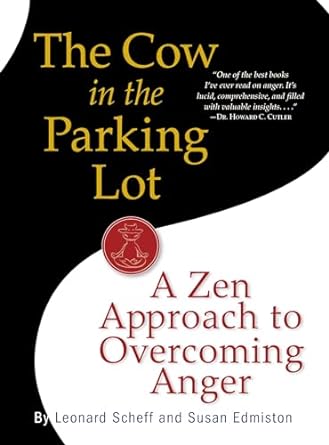The Cow in the Parking Lot at Amazon.com
“The Cow in the Parking Lot: A Zen Approach to Overcoming Anger” by Leonard Scheff and Susan Edmiston is a practical guide to managing and overcoming anger through a combination of Zen principles and psychological insights. The book offers readers effective tools and techniques for transforming anger into compassion and understanding, drawing on both ancient wisdom and contemporary psychology.
Key themes in the book include:
- Understanding Anger: Scheff and Edmiston explore the roots of anger, explaining how it often stems from unmet expectations and a sense of entitlement. They emphasize the importance of recognizing the underlying causes of anger to address it effectively.
- The Zen Approach: The book integrates Zen teachings, which encourage mindfulness, acceptance, and detachment from ego-driven desires. By adopting a Zen perspective, readers can learn to observe their anger without being controlled by it.
- The Cow in the Parking Lot Metaphor: The title metaphor illustrates how a shift in perspective can change emotional reactions. If a cow blocks your car in a parking lot, you’re less likely to get angry than if another driver does. This analogy helps readers see how their responses are often based on personal interpretations rather than the actual events.
- Practical Exercises: The authors provide numerous exercises and techniques to help readers manage their anger. These include mindfulness practices, deep breathing, and cognitive restructuring, all aimed at helping individuals remain calm and composed in triggering situations.
- Compassion and Empathy: Scheff and Edmiston emphasize the role of compassion and empathy in overcoming anger. By understanding and empathizing with others, readers can diffuse their anger and foster more positive interactions.
- Letting Go of Entitlement: A significant aspect of the book is the idea of letting go of entitlement and unrealistic expectations. The authors argue that much of our anger arises from a sense of entitlement to have things go our way. By releasing these expectations, we can reduce our anger.
- Mindfulness and Present Moment Awareness: The book teaches readers to stay present and mindful, reducing the tendency to dwell on past grievances or future anxieties. This practice helps in maintaining emotional balance and reducing anger.
- Real-Life Scenarios: Scheff and Edmiston provide real-life examples and case studies to illustrate how the principles and techniques discussed can be applied in everyday situations. These stories make the concepts more relatable and practical.
- Long-Term Change: The authors stress that overcoming anger is a gradual process that requires ongoing practice and commitment. They offer guidance on how to maintain progress and continue developing healthier emotional responses.
Overall, “The Cow in the Parking Lot” is a valuable resource for anyone looking to understand and manage their anger more effectively. Leonard Scheff and Susan Edmiston combine Zen wisdom with practical psychological strategies, offering readers a comprehensive approach to transforming anger into peace and understanding.
Similar Books
“Anger: Wisdom for Cooling the Flames” by Thich Nhat Hanh
A comprehensive guide to understanding and transforming anger through mindfulness and compassion.
“Beyond Anger: A Guide for Men” by Thomas J. Harbin
Offers practical advice and strategies specifically for men to manage and overcome anger.
“The Dance of Anger: A Woman’s Guide to Changing the Patterns of Intimate Relationships” by Harriet Lerner
Explores how women can understand, manage, and use their anger constructively in relationships.
“Radical Acceptance: Embracing Your Life with the Heart of a Buddha” by Tara Brach
Focuses on mindfulness and self-compassion as tools for emotional healing and acceptance.
“The Anger Trap: Free Yourself from the Frustrations that Sabotage Your Life” by Les Carter
Offers insights into recognizing and escaping the patterns of anger that can dominate our lives.
“Emotional Intelligence: Why It Can Matter More Than IQ” by Daniel Goleman
Explores the role of emotional intelligence in managing emotions and relationships effectively.
“The Mindful Path to Self-Compassion: Freeing Yourself from Destructive Thoughts and Emotions” by Christopher K. Germer
Provides practical exercises and insights into using mindfulness and self-compassion to deal with difficult emotions.
“When Anger Hurts: Quieting the Storm Within” by Matthew McKay, Peter D. Rogers, and Judith McKay
A guide to understanding and managing anger through cognitive-behavioral techniques.
“Letting Go of Anger: The Eleven Most Common Anger Styles and What to Do About Them” by Ronald Potter-Efron and Patricia Potter-Efron
Identifies different anger styles and provides strategies for managing and overcoming each.
“The Cow in the Parking Lot: A Zen Approach to Overcoming Anger” by Leonard Scheff and Susan Edmiston
Uses Zen principles and practical exercises to help readers transform their anger into understanding and compassion.
“The Art of Happiness” by Dalai Lama and Howard Cutler
Discusses the principles of happiness and how to achieve it through compassion and mindfulness.
“Full Catastrophe Living: Using the Wisdom of Your Body and Mind to Face Stress, Pain, and Illness” by Jon Kabat-Zinn
Offers a comprehensive guide to mindfulness-based stress reduction and its applications for managing emotions.
“The Book of Joy: Lasting Happiness in a Changing World” by Dalai Lama, Desmond Tutu, and Douglas Abrams
Explores the nature of joy and how to cultivate it in the face of life’s challenges.
“Mindfulness for Beginners: Reclaiming the Present Moment—and Your Life” by Jon Kabat-Zinn
An introduction to mindfulness and its benefits for emotional regulation and well-being.
“The Power of Now: A Guide to Spiritual Enlightenment” by Eckhart Tolle
Focuses on the importance of living in the present moment and letting go of past and future worries.
